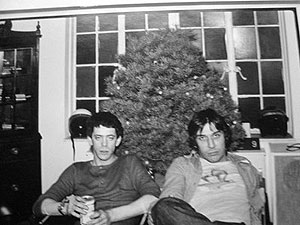Top Five Music Scandals Which Never Actually Happened
Published on May 30th, 2009 in: Issues, Listicles, Music, Top Five Lists |3. Hall and Oates vs. Loggins and McDonald, Late 1970s
In the late 1970s, smooth adult-contemporary rock began to rule the airwaves. A singer named Michael McDonald paired up with Kenny Loggins in an attempt to write the “smoothest” soft rock hit ever recorded in the history of man. However, their early attempts were discarded, and they found themselves lacking in inspiration.

Damn, it feels good to be a gangsta.
The two songwriters were confronted at a backyard barbecue by a mercenary Hall and Oates, who at the time possessed the smoothest sounds one could find on the AM dial. A clearly intimidated McDonald and Loggins once again retired to their songwriting, but could come up with absolutely nothing. A furious dance-off with Hall and Oates had also embarrassed Loggins and McDonald enough that they wanted to quit the music business altogether; the turbulent waters of soft rock seemed too risky to even attempt to navigate.
As if God Himself had given the Holy Grail of soft rock down from the heavens, McDonald woke up one morning with the phrase “what a fool believes” stuck in his head. He quickly drove down to Loggins’ residence and they churned out a song which easily dethroned Hall and Oates from their status as the Kings of Soft Rock. Somehow during this struggle, a man was killed, and a young musician named Christopher Cross showed up singing a hit called “Sailing,” which would also forever change the landscape of AM radio.
This struggle was caught on videotape for posterity, and is an excellent account of the soft rock scene in the late 1970s. It clearly shows that the world of adult contemporary music was easily turning into a Biggie vs. Tupac style bloodbath in the late 1970s. Despite the many deaths and destroyed dreams, the music still remains . . .
2. The Beatles’ Warhol Tapes, 1969 – 1971
With the departure of (now) Sir Paul McCartney from the Fab Four in 1969, the three remaining members of The Beatles were left with a plethora of talent and ideas for the upcoming decade of decadence known as the 1970s, but were short a writing foil for John Lennon. Once Let It Be hit record store shelves, and the film became a commercial success, the Terrific Three (as they started trademarking themselves) began plotting their course without Paul.
Lennon tried collaborating with a number of other songwriters, including American poet Shel Silverstein (who had recently penned Johnny Cash’s classic “A Boy Named Sue”). He also persuaded Paul Simon of the folk duo Simon & Garfunkel to collaborate with him (a move that would permanently damage the relationship between the duo, but led to one of the most popular reunion concerts in modern times), and during a holiday in Jamaica, he befriended a young man named Robert Marley who after a week-long bacchanalian session decided it would be best to continue touring with his band, The Wailers.

“Lou took my Heineken.”
Detail of photo by Kate Simon from the Gillian McCain/Jim Marshall collection
Eventually, Lennon found a young New York guitarist named Louis Reed and a Welsh bassist named John Cale willing to lock themselves in the Abbey Road studios and finish writing songs for the group’s first album without their well-known bassist.
The Beatles released the first Lennon/Reed/Cale recording in September, 1970. The single, “It Never Should Have Been That Way,” was the first song Lennon had written that he did not sing on. In fact, it would begin a trend in which the group’s new producer, artist Andy Warhol, would transform drummer Ringo Starr, and not Lennon, into the group’s new enigmatic frontman, while studio drumming would now be performed by a young Londoner named Phil Collins.
The LP Grey Water would follow on January 5, 1971. Warhol told Melody Maker the week of release that The Beatles had “embarked on a new journey that would bring listeners to the cutting edge of musical experience.” BBC Radio 1 refused to play any cuts from the album because of Starr’s frequent use of obscenity, and Lennon and wife Yoko Ono’s depiction of coitus which Warhol had mixed into every single track on the album.
A radio station in Dubuque, Iowa played the first 45 seconds of the album’s opening song, “When Will You Come?” before realizing its sexually explicit connotation. The station, WDBQ-AM, was besieged by hundreds of complaints, and was eventually fined $1,500 by the Federal Communications Commission for playing indecent material. The local hospitals also reported an increase in childbirths nine months after the record was played on the air.
Other songs included “Off to the Derby (With My Baby in Tow),” which told the story of a man who sells his child for heroin; “To Icarus,” a disparaging song aimed directly at McCartney (who had started a new band, named “Wings”); and “The Revelation of St. John,” which sets the final book of the Holy Bible to music (the song takes up the entire B-side of the LP).
Feeling pressure from multiple sources, the Terrific Three ended up disbanding after a short European tour in early 1971. Apple Records was able to recall most copies of the album. However, a few copies remain at large, and could fetch almost a half-million dollars at auction, if the owners wouldn’t be prosecuted for their possession.
Track Listing:
1) When Will You Come? (Lennon/Reed/Cale)
2) We Don’t Need That (Lennon/Reed/Cale)
3) Off To The Derby (With My Baby In Tow) (Lennon/Reed/Cale)
4) To Icarus (Lennon/Reed/Cale)
5) His Will Is Strong (Harrison)
6) The Day After Tomorrow (Lennon/Reed/Cale)
7) The Revelation of St. John (Lennon/Reed/Cale)
3 Responses to “Top Five Music Scandals Which Never Actually Happened”
May 31st, 2009 at 8:25 am
“Lou took my Heineken.”
May 31st, 2009 at 10:29 am
Haha, yes!
This piece makes me laugh just *thinking* about it.
LLM
July 30th, 2009 at 10:20 pm
[…] affair was obviously not welcomed by Paula’s husband, who just happened to be Bob Geldof, self-aggrandizing Midge Ure-hater extraordinaire. Some nasty pictures of the two engaged in sexual congress were allegedly found and publicized […]
Time limit is exhausted. Please reload the CAPTCHA.